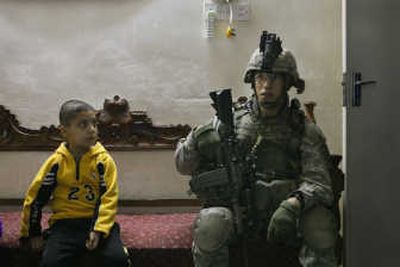Bloody day leaves dozens dead

BAGHDAD – Car bombs and gunmen struck U.S.-allied fighters, police and civilians Sunday in northern Iraq, killing as many as 53 people.
The violence coincided with a visit by Defense Secretary Robert Gates to Baghdad, where he warned that hard choices face Iraq’s political leaders on how to stabilize the country despite promising new signs of progress toward reconciliation.
The visit was Gates’ first to Iraq this year. He told reporters traveling with him that Iraqi politicians “seem to have become energized over the last few weeks” and that he was eager to “see what the prospects are for further success in the next couple of months.”
The deadliest bombing on Sunday was near Balad, 50 miles north of Baghdad.
Police said a suicide truck bomber targeted a checkpoint manned by U.S.-allied fighters and Iraqi police at the entrance to a bridge in the district of Yathrib on the outskirts of Balad. Security forces opened fire on the driver, but he managed to detonate his payload, devastating a nearby car market and other stores.
Police in surrounding Salahuddin province and hospital officials said 34 people were killed and 37 wounded. Capt. Kadim Hamid said many residents in the predominantly Sunni area had removed victims directly from the site because they feared going to the hospital in Balad’s mostly Shiite center.
The U.S. military put the casualty toll at 23 killed, 25 wounded and said a car bomb exploded near an Iraqi checkpoint in a market in Balad, but it did not confirm it was a suicide attack. U.S. and Iraqi forces had secured the area, and the wounded had been evacuated to hospitals, according to a statement.
The explosion came hours after suspected al-Qaida-linked insurgents stormed two villages near the Syrian border but were repelled by U.S.-allied fighters and Iraqi security forces in clashes that left at least 22 people dead.
Sheik Fawaz al-Jarba, head of the Mosul anti-al-Qaida group, and other officials said the 22 killed included 10 militants and six members of the so-called awakening group in the area, as well as four women and two children.
Iraqi Prime Minister Nouri al-Maliki has promised a “decisive battle” against the terror network in Mosul but given no start date. The U.S. military has warned it will not be a swift strike, but rather a grinding campaign that will require more firepower.
An al-Qaida front group for northern Iraq warned last week in an Internet statement that it was launching its own campaign in Mosul and surrounding areas.
In all, 70 people were reported killed or found dead by police on Sunday, one of the highest nationwide death tolls in recent months. That figure included three policemen who perished in a suicide car bombing at a checkpoint in the Anbar city of Fallujah and 10 bullet-riddled bodies showing signs of torture.